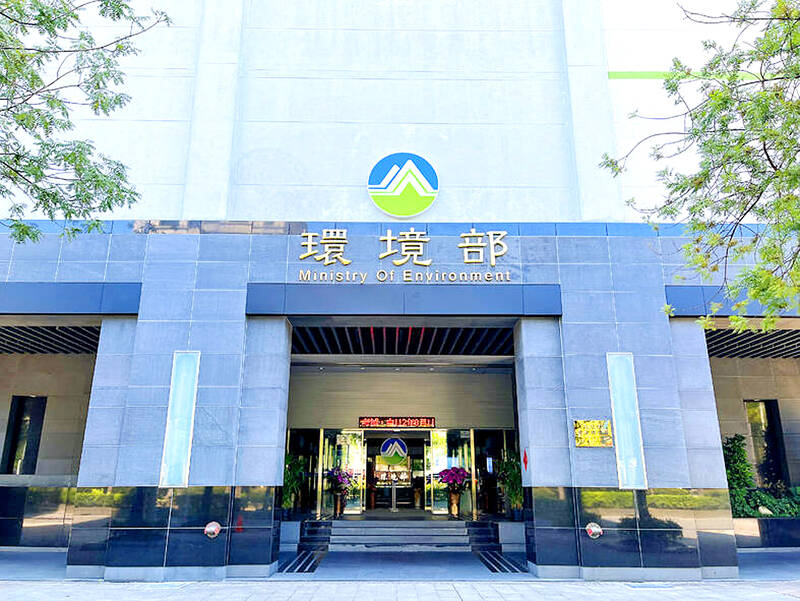The Ministry of Environment on Thursday released a set of guidelines for corporations to declare carbon neutrality in a bid to discourage “greenwashing,” but no penalties were included for noncompliance.
The guidelines encourage corporations to use its definition in declaring carbon neutrality for their products, services or organizations “to avoid circumstances under which they could make false declarations or mislead the public without revealing adequate information,” the ministry said.
“We have seen products, or even events such as marathons, claiming to have achieved carbon neutrality, but if the corporations have a distorted definition of the term, or consumers have little understanding of it, then that declaration becomes pointless,” Deputy Minister of Environment Shih Wen-chen (施文真) said.

Photo: Chen Chia-yi, Taipei Times
The new guidelines aim to avoid “greenwashing,” which the World Economic Forum (WEF) says takes the form of “selective disclosure” or “symbolic actions,” a ministry official told a news conference in Taipei.
The WEF defines “selective disclosure” as advertising positive environmental aspects of a product while hiding the negative factors, while “symbolic actions” refer to a focus on attention-grabbing activities, such as purchasing carbon credits, while failing to take substantial action to cut emissions.
The ministry said that its guidelines, which were compiled based on international standards such as the ISO14068-1 and the Greenhouse Gas Protocol, have three main stages that need to be followed for a product or service to be considered carbon neutral.
First, companies must perform a complete calculation of their carbon emissions, or the products and services for which they want to declare carbon neutrality, the ministry said.
Corporations should then publicly state its science-based decarbonization pathway and how much carbon they reduced, with verification from an independent certification agency, it said.
In the third stage, which can only be undertaken after the first two are completed, accredited carbon credits would be used to offset emissions, it said.
The ministry would not take any initiatives to examine products or services that corporations claim to be carbon neutral, nor would it provide certification, Shih said.
“For now, compliance with the guidelines is voluntary, as our aim is mainly education and advocacy,” she said. “Public discussion would be needed if the guidelines are to be made compulsory.”
As such, no penalties would be imposed for failure to follow the guidelines, but consumers can report “false or misleading advertising” to the Fair Trade Commission, which would assess the case based on the ministry’s guidelines, she said.

A Taiwanese software developer has created a generative artificial intelligence (AI) model to help people use AI without exposing sensitive data, project head Huang Chung-hsiao (黃崇校) said yesterday. Huang, a 55-year-old coder leading a US-based team, said that concerns over data privacy and security in popular generative AIs such as ChatGPT and DeepSeek motivated him to develop a personal AI assistant named “Mei.” One of the biggest security flaws with cloud-based algorithms is that users are required to hand over personal information to access the service, giving developers the opportunity to mine user data, he said. For this reason, many government agencies and

The National Fire Agency on Thursday said a series of drills simulating a magnitude 8.5 earthquake would be held in September to enhance the government’s emergency response capabilities. Since earthquakes cannot be predicted, only by continuously promoting disaster prevention measures could Taiwan enhance its resilience to earthquakes, agency Director-General Hsiao Huan-chang (蕭煥章) said in a news release. The exercises would be held to mark annual National Disaster Prevention Day on Sept. 21, the aim of which is to test Taiwan’s preparedness and improve its earthquake resilience in case of a major temblor, Hsiao said. As part of those drills, an earthquake alert would

DEFENSE: The National Security Bureau promised to expand communication and intelligence cooperation with global partners and enhance its strategic analytical skills China has not only increased military exercises and “gray zone” tactics against Taiwan this year, but also continues to recruit military personnel for espionage, the National Security Bureau (NSB) said yesterday in a report to the Legislative Yuan. The bureau submitted the report ahead of NSB Director-General Tsai Ming-yen’s (蔡明彥) appearance before the Foreign and National Defense Committee today. Last year, the Chinese People’s Liberation Army (PLA) conducted “Joint Sword-2024A and B” military exercises targeting Taiwan and carried out 40 combat readiness patrols, the bureau said. In addition, Chinese military aircraft entered Taiwan’s airspace 3,070 times last year, up about

STRICTER ENFORCEMENT: Taipei authorities warned against drunk cycling after a sharp rise in riding under the influence, urging greater public awareness of its illegality Taipei authorities have issued a public warning urging people not to ride bicycles after consuming alcohol, following a sharp rise in riding under the influence (DUI) cases involving bicycles. Five hundred and seven people were charged with DUI last year while riding YouBikes, personal bicycles, or other self-propelled two-wheelers — a fourfold increase from the previous year, data released by the Taipei Police Department’s Traffic Division showed. Of these, 33 cases were considered severe enough to be prosecuted under “offenses against public safety,” the data showed. Under the Road Traffic Management and Penalty Act (道路交通管理處罰條例), bicycles — including YouBikes and other